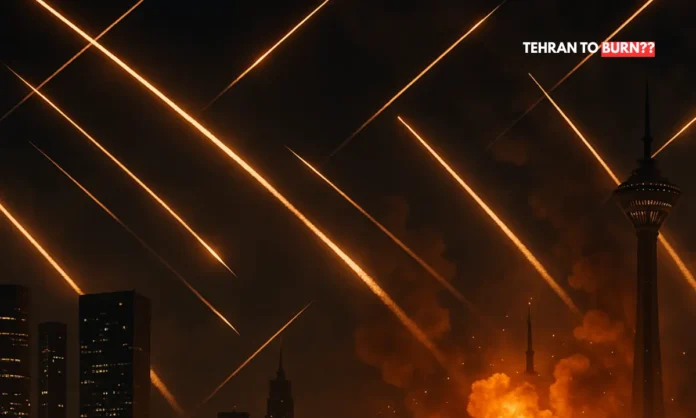SUMMARY
- Israel’s Defence Minister warns Tehran residents will “pay the price” amid tit-for-tat strikes.
- Iran responds with missile attacks on Israeli cities; Supreme Leader vows to continue pressure.
- Global fears mount over oil prices, civilian safety, and an escalating Middle East war.
Missiles, Messages, and Middle East Mayhem: A Tipping Point Unfolds
With missiles lighting up the skies over Tel Aviv and Tehran, the Israel-Iran conflict has entered a perilous new chapter. Following Iran’s latest barrage of missiles into Israeli territory, Israel’s Defence Minister Israel Katz issued a chilling statement: “The residents of Tehran will pay the price, and soon.” While he later clarified there was “no intention to physically harm civilians,” the damage—to both infrastructure and the fragile hope for de-escalation—may already be done.
Katz’s initial statement, branding Iran’s Supreme Leader Ali Khamenei as an “arrogant dictator,” coincided with Israeli airstrikes targeting Iranian Quds Force command centres. Iran responded swiftly, raining down missiles on multiple Israeli cities. The Iranian regime described the strikes as retaliation and a warning, claiming 230 casualties in Iran and 18 in Israel.
What distinguishes this latest clash is the public rhetoric that increasingly places civilian populations in the crossfire—rhetorically if not militarily. Israel’s warning, even if partially walked back, has escalated international concerns over the potential expansion of conflict into urban heartlands. The resulting humanitarian and economic consequences, including spiking global crude prices, reflect just how combustible the region has become.
WAR ZONE UNLEASHED: Middle East on the BRINK!
— Najaat (@Mohdnajaat) June 16, 2025
Iran vows “unstoppable retaliation” after Israel strikes deep into Tehran and other cities.
Proxy forces mobilized — full-scale regional WAR seems hours away!#IranIsraelConflict #WW3Alert pic.twitter.com/Nkd9LBneiL
The Language of Deterrence: Civilian Centres as Strategic Leverage
- Defence Minister Katz warns of civilian impact, then clarifies stance.
- Iranian and Israeli leadership weaponise rhetoric amid real-world bombardments.
- Middle East tension spills over into economic fears and geopolitical alarms.
The ambiguity of Israel’s warning encapsulates a broader shift in military posturing in the Middle East. No longer limited to covert actions or proxy skirmishes, both Tehran and Tel Aviv now appear willing to publicly involve civilian domains in their strategic calculus. While Israel insists it will target infrastructure and not citizens, the psychological warfare embedded in such statements is undeniable.
Iran’s Supreme Leader Ali Khamenei, for his part, described Israel as an “evil Zionist enemy” and promised that life would “become bitter” for its people. His warning followed Iranian missile strikes on Israeli cities and a video campaign framing the assault as justified vengeance. This rhetoric aims to consolidate domestic support while signaling international defiance.
Meanwhile, visuals from Tel Aviv and Jerusalem revealed flattened buildings and chaotic evacuations. Though both governments maintain that their actions are defensive and targeted, the escalating language and retaliatory strikes suggest a mutual drift toward total war logic.
Collateral Calculations: Civilian Cost in the Theatre of War
- 230 deaths reported in Iran; 18 fatalities in Israel from reciprocal strikes.
- Visual confirmation of civilian infrastructure damage in both capitals.
- Global commodity markets react; oil prices see sharp uptick.
Beyond rhetoric and retaliation lies a cost counted in human lives and societal breakdown. As Israeli Defence Forces targeted Iranian command nodes—allegedly the base for orchestrated proxy attacks—Tehran’s response was blunt and sweeping. Missiles struck with little warning, and despite shelter alerts, casualties were unavoidable.
Civilian harm in such exchanges, even when unintended, alters the narrative from geopolitical tension to humanitarian crisis. The near-simultaneous attacks on population-adjacent zones risk turning urban environments into theatres of war.
Economic reverberations are already being felt. With oil exports potentially disrupted and investor confidence shaken, the fallout is far from regional. Supply chains, security alliances, and even diplomatic equations are being recalibrated in real time.
Strategic Ambiguity or Civilian Threat? The Stakes Now
The Israel-Iran conflict has long played out through shadow proxies and selective escalation. But with Tehran and Tel Aviv now invoking civilian consequences, the ground has shifted. What once simmered is now at a boiling point, and unless cooler heads intervene, the path ahead may resemble not calculated deterrence—but collapse.


